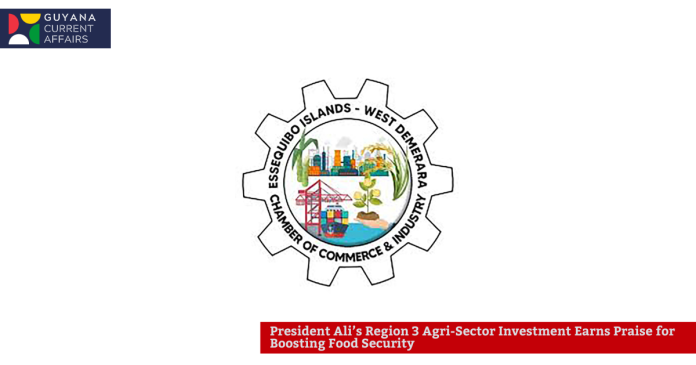President Dr. Mohamed Irfaan Ali’s targeted investments in the Region 3 agricultural sector have drawn strong endorsement from the Essequibo Islands–West Demerara Chamber of Commerce and Industry (R3CCI), with local leaders hailing the initiatives as transformative for both regional and national food security.
R3CCI has lauded the President’s direct engagement with fisherfolk, rice producers, and cash crop farmers, highlighting his “bold vision” for empowering grassroots producers and deepening the region’s role in Guyana’s overall food plan. The Chamber emphasized that these measures offer new hope for sustainable livelihoods and shared prosperity, particularly for those operating at the lower tiers of the food production value chain.
Key elements of the investment include a G$50 billion allocation to upgrade all farm-to-market access roads to all-weather standards, significantly reducing transportation costs, increasing efficiency, and minimizing spoilage. Additionally, hundreds of thousands of acres of new land are being opened for farming and other activities, with the government providing combines to assist rice farmers with between one and 30 acres of land during harvests.
The government is also investing in world-class storage and drying facilities, developing a food hub for processing, packaging, and exporting products, and establishing an agriculture development fund. Other initiatives focus on climate-smart and resilient techniques, such as shade houses and hydroponics, as well as building a fertilizer production facility.
President Ali’s message to Region 3 producers centered on inclusivity, access to equipment, improved infrastructure, and stronger market linkages—priorities long sought by local producers grappling with rising costs, fluctuating prices, and limited financing. R3CCI noted that these investments will modernize traditional farming, create new income opportunities, and position Region 3 as a driver of innovation and sustainable growth.
The Chamber also pledged to intensify collaboration with the Ministry of Agriculture and other stakeholders, supporting small and medium-sized enterprises (SMEs) with grants, market intelligence, and training. These efforts are aligned with Guyana’s broader “25 by 2025” plan to reduce CARICOM’s food import bill, with Region 3 recognized for its unique mix of talent, land, and logistics to help achieve this ambitious target.


